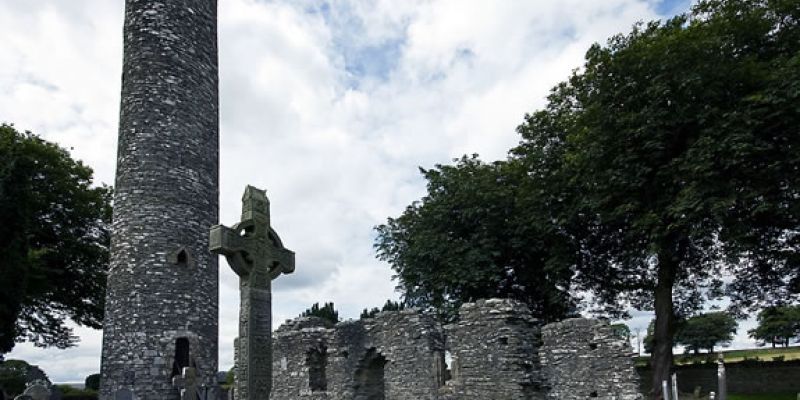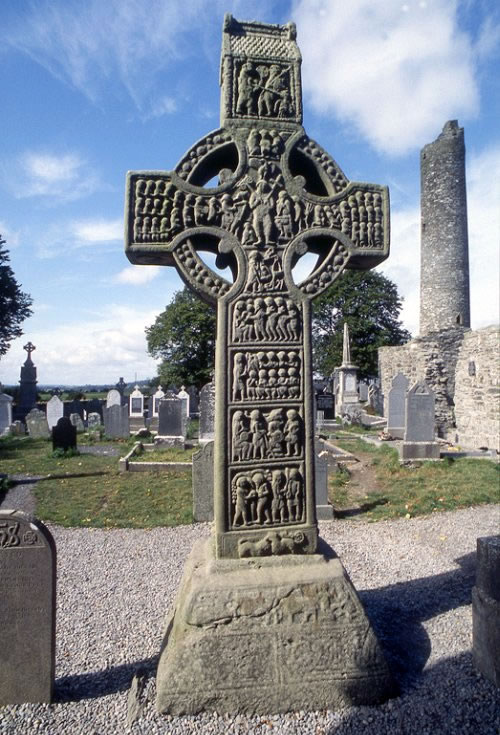
Last year, I was visiting Monasterboice, an Irish monastic settlement that dates back to the fifth century, with a group of Australian pilgrims who were on pilgrimage in the footsteps of St. Columban.
While the group was lost in admiration and amazement at St. Muiredach’s High Cross, which dates back to the 10th century and is the finest of its type in Ireland, I noticed out of the corner of my eye, an elderly lady sitting in pensive mood at a recently filled-in grave. She was wrapped up in her own thoughts and totally oblivious to what was happening around her. I later learnt that she was sitting at her late husband´s grave; he had passed away some months earlier.

The contrasting scenes caught my attention: a lone elderly lady alongside the grave of the man whom she had loved for more than forty years, and a group of industrious pilgrims soaking up as much information as possible, and making sure that every corner of the churchyard, from the round tower to the ancient gravestones, were captured on their digital cameras and iPhones. Yet, all of us at that churchyard were part of the same story. It is our story of journey and pilgrimage through life.
These Australian pilgrims were tracing the footsteps of St Columban, whose feast we celebrated on November 23. They were on a pilgrimage, making connections with more than 1,400 years of Christian monasticism and wanting to become part of the story. Their reason for coming on pilgrimage was, among other things, to figure out how best they could become pilgrims for Christ in the 21st century. They stood on the sacred ground of Monasterboice, wrapped up in the mystery of the message portrayed in the High Crosses.
While not too far away, the elderly widow kept watch and prayed: I imagined that she tried to look beyond the grave and celebrate a love that cannot be broken by death.
During November, somehow I experienced the same connectedness with both family members and friends who have passed away. Each period of my life has been marked by the harsh reality of death, by the passing of someone close to me. I find solace in visiting their graves, as it is a tangible sign of my lasting relationship with them. Just to be there in the present moment and silently pray is enough for me. November is a time of remembering those gone before us and a time for treasuring memories and the small nuggets of love and affection that very often have flowed over into our own lives and have made us better people.
The Australian pilgrims were also on a journey to discover some insights into what inspired St. Columban to become a “Pilgrim for Christ”. The answer was carved into the very stone of the High Crosses: we are on a journey towards the Kingdom of God. It is about a Kingdom that we, as followers of Jesus, can experience in the inner thoughts of our hearts.
As we draw towards the season of Advent in preparation for Christmas, is not the Kingdom of God what we are longing for? We do need an Advent every year for it is the season of great hope. As winter draws near and the earth is covered with darkness, the wonderful gift of Advent Hope and Christmas Joy can pull us through all the obstacles, difficulties and darkness that affect us all.
I remember well that gathering at Monasterboice, for in spite of the fact that we were in a graveyard that has served the community for more than 1,500 years, the stones are symbols of hope. These breathe life and issue an invitation to journey in the now and transport us into a timeless future where the memories of love forever abide.
The author, a Columban priest, wishes to remain anonymous.


 The Columbans are a society of missionaries, including priests and lay people, who minister to people of various cultures as a way of witnessing to the universal love of God.
The Columbans are a society of missionaries, including priests and lay people, who minister to people of various cultures as a way of witnessing to the universal love of God.